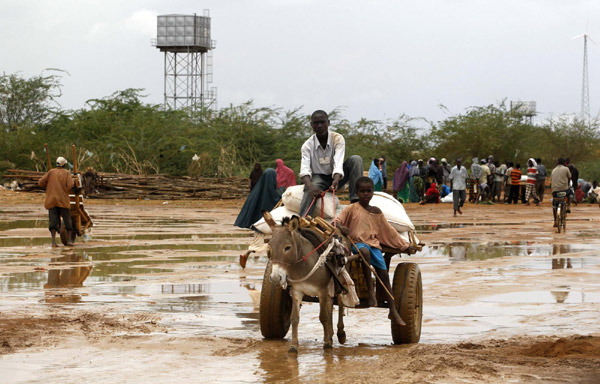AU backs Kenyan military operation
 |
|
Newly arrived Somali refugees ride a donkey along the street at the Ifo Extension refugee camp in Dadaab, near the Kenya-Somalia border October 19, 2011. [Photo/Agencies] |
NAIROBI - The African Union is backing Kenya's military operation against Somalia's militia group of Al Shabaab, Kenya's Minister for Foreign Affairs Moses Wetangula said on Wednesday.
Speaking upon arrival in Nairobi from a visit to Addis Ababa, Ethiopia, Wentangula said following his meeting with AU Chairman Jean Ping, AU voiced full support for Kenya on its endeavor to neutralize armed insurgency against the Kenyan people by the militia.
"The African Union is of the view that a threat to Kenya is a threat to peace in the region because of Kenya's past and present efforts for negotiated settlements of armed conflict in the region," said the minister who was flanked by his Defense counterpart Mohammed Yusuf Haji.
"In view of this the Union stands with Kenya in its efforts to protect its territory and its citizens from the terrorist group," he said.
Wetangula said Ethiopia similarly expressed its support for Kenya in its effort to keep its people safe following a meeting with Ethiopia's Prime Minister Meles Zenawi.
The minister, however, clarified that Kenya has not invaded Somalia but is pursuing an armed terrorist group inside that country following the violation of its territorial integrity and also at the invitation of the Transitional Federal Government of Somalia.
"When your neighbor has a problem and calls upon you to assist, you respond to the cry but the problems still remains his," explained Wetangula.
Kenya considers Ethiopia, whose soldiers sent to Somalia in 2006, a crucial ally in the war against the Al-Shabaab in the region given its strategic location, bordering Somalia on the western side.
"We are not at war with Somalia but are inside the country partly because of a terrorist group that had considered Somalia too small and decided to extend its activities to Kenya and also as a response to a call of help from the TFG."
Before travelling to Addis Ababa, the Kenyan delegation visited Mogadishu and held talks with the government of President Sharif Sheikh Ahmed during which the security situation in Somalia was discussed and it was agreed upon that the two governments continue working together to stabilize Somalia and to stamp out the threats of the Al Shabaab.
During the meeting in Addis Ababa, Ping said Kenya has a right to protect her economic and security interests.
At a meeting with a high powered Kenyan delegation led by Wetangula, Ping pledged to defend Kenya's military action against Al-Shabaab including in the United Nations Security Council.
The AU chairman emphasized that in the face of blatant violation of her territorial integrity by Al-Shabaab terror group, Kenya is justified in its actions against the Islamic militants.
He praised Kenya for her leading role in brokering peace in the Horn of Africa and the region. "Despite persistent provocations by Al-Shaabab, Kenya has maintained its diplomacy in her foreign policy," Ping said.
The Kenyan delegation met the AU chairman to brief him on Tuesday's meetings with the president of the Federal Transition Government of Somalia and key members of his government.
Wetangula briefed the AU chairman on the fruitful meetings the Kenya delegation had with the president and senior Transition Federal Government (TFG) of Somalia on Tuesday.
The minister said the Kenyan government has resolved to forge a common political and security strategy with the TFG so as to forestall the threat posed by the terror gang on people of the two countries.
He expressed the desire for peace and tranquillity among countries in the continent and the full understanding of the dynamic of the horn of Africa and the East African region.
He thanked the AU for the continued support for peace and security in the continent particularly the troubled Somalia and the horn of Africa.
While in Addis Ababa, the Kenya delegation met Prime Minister of Ethiopia Meles Zenawi to deliver a special message from President Mwai Kibaki.
"The Prime Minister gave Ethiopia's unequivocal support for Kenya's efforts to eliminate this (Al Shabaab) menace. He said that any threat to Kenya's security is a threat to the horn of Africa and urged us to use everything at our disposal to eliminate the menace," Wetangula said.
Al-Shabaab militia, which controls large swathes of southern and central Somalia, including areas close to the border with Kenya, has in the recent past been responsible for kidnappings of foreigners in search of ransom payments.
In the face of extreme provocation by the Al-Shabaab insurgents, Kenya closed its border with the anarchic Somalia, and will screen all refugees in the country to weed out suspect elements and sympathisers.
Al-Shabaab is believed to be responsible for seven major incidents, including the brazen attacks on Dadajabula Police Post in 2009, raid on Liboi General Service Unit Camp last year, and the laying of mines and improvised explosive devices against Kenya police and military in Mandera last July.
Others are the numerous kidnappings and hijackings within Kenya' s borders, including two Catholic nuns in Elwak in 2009, two military soldiers last July, and the recent seizure of British, French and Spanish nationals in Lamu and Dadaab, one of the world's largest refugee camps.
The combined troops and tanks backed by the TFG soldiers crossed the border into war-torn Somalia on Sunday to attack Islamist Al Shabaab rebels.
However, Al-Shabaab spokesman Sheikh Ali Mohamud Rage told a news conference in Mogadishu on Monday that Kenyan troops have moved 100 kilometers into Somalia and carried out airstrikes in the country.
He said al-Shabaab fighters will carry out reprisals inside Kenya unless Kenya withdraws its forces. The exact size and location of Kenyan forces in Somalia is not clear.
The Kenyan authorities blame Al-Shabaab for a series of recent kidnappings that could jeopardize Kenya's status as a safe tourist destination.





















